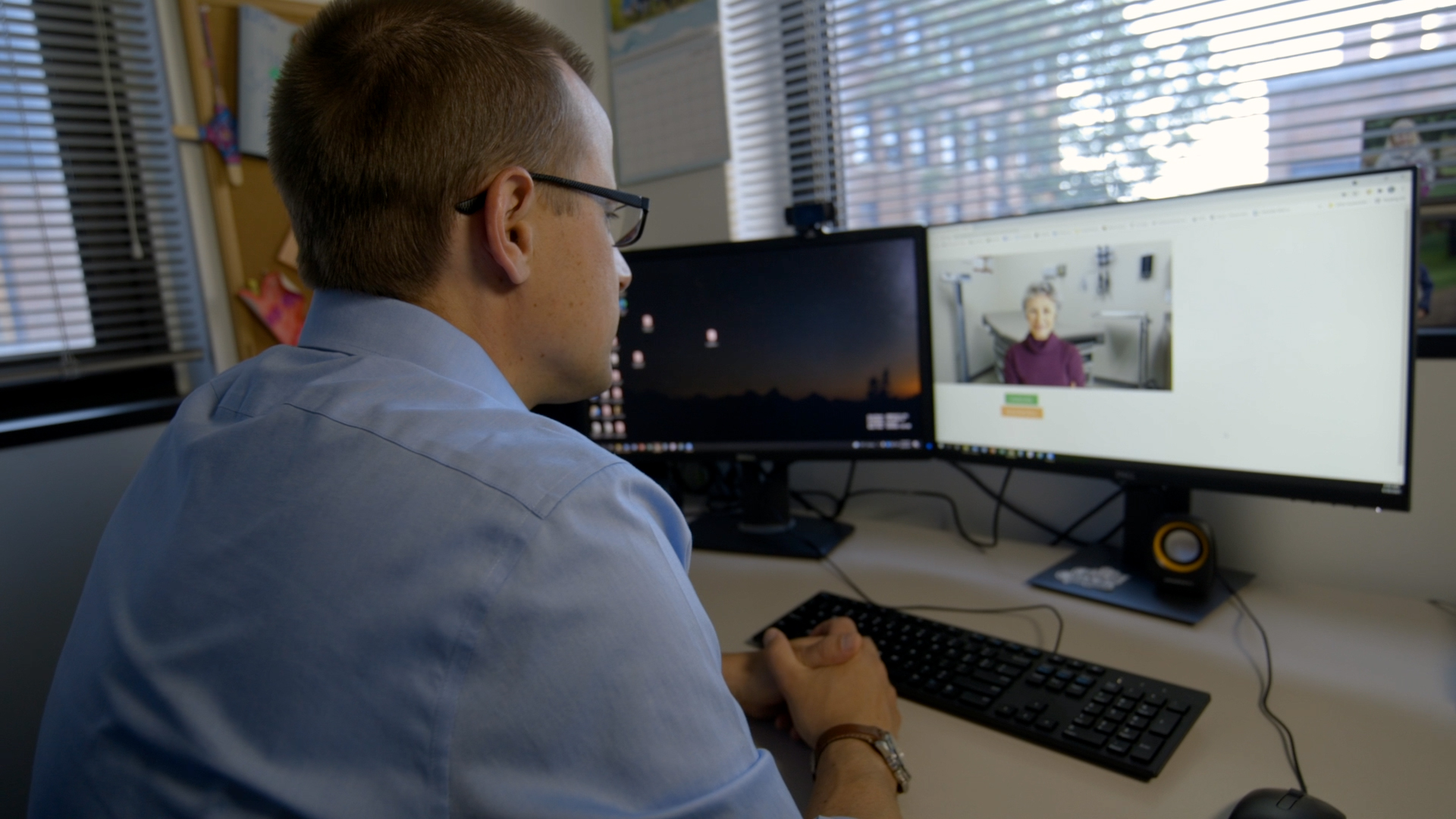|
|
|
|
 Thomas Carroll, associate professor of medicine at the University of Rochester Medical Center, engages in an online conversation with SOPHIE, an avatar that uses artificial intelligence to help teach doctors how to effectively communicate with their patients. (University of Rochester photo / Matt Mann)
A new way to prepare doctors for difficult conversationsAs many as 68 percent of late-stage cancer patients leave their doctor’s offices either underestimating the severity of their disease, overestimating their life expectancy—or both. These misunderstandings can hinder the ability of patients and their families to make realistic decisions about whether to continue aggressive treatments or instead turn to palliative care.
To address the problem, University computer scientists, palliative care specialists, and practicing oncologists are perfecting SOPHIE (Standardized Online Patient for Healthcare Interaction Education)—an online virtual “patient” that helps physicians practice how to communicate effectively with late-stage cancer patients about their disease.
“During difficult conversations about facing the potential of one’s own death, patients are frightened and don’t know how to ask the right questions, and clinicians may oversimplify, omit, or sugar-coat information, or feel too pressed for time to address patients’ emotions,” says Ehsan Hoque, an associate professor of computer science at Rochester’s Hajim School of Engineering and Applied Sciences. The COVID-19 pandemic has made effective communication even more difficult by causing increasing reliance on virtual rather than in-person interactions between patients and physicians, adds Hoque.
SOPHIE is possible because of a body of nearly 400 conversations that were recorded between late-stage cancer patients and their oncologists, and initially analyzed by palliative care expert Ronald Epstein and his collaborators at the Medical Center. Epstein’s Center for Communication and Disparities Research focuses on how to improve communication between clinicians, patients, and their loved ones.
A paper in IEEE Transactions on Affective Computing describes how lead author Mohammad Rafayet Ali, a postdoctoral researcher, and PhD student Taylan Sen, both members of Hoque’s Rochester Human-Computer Interaction (ROC HCI) Lab, created algorithms that could be applied to the transcripts of these conversations, so the researchers could develop metrics to assess a physician’s ability to communicate clearly with patients.
The metrics focus specifically on the extent that physicians engage in lecturing—delivering a lot of information without giving the patient a chance to ask questions or to respond—or, on the plus side, how well they employ “sentiment trajectory”—using positive words and phrases in ways associated with increased patient understanding. Read more.
Clinical Cardiovascular Research Center receives $17 millionThe University’s Clinical Cardiovascular Research Center (CCRC) has received five new grants totaling more than $17 million over five years from both the National Institutes of Health (NIH) and Abbott. The grants will support research in treatment of atrial fibrillation (AF), device therapy for heart failure, and management of Left Ventricular Assist Device (LVAD) patients.
Led by Ilan Goldenberg, professor in the Department of Medicine, the CCRC has been involved in the design, conduct, and analysis of large scale national and international clinical research studies for more than four decades.
Faculty members who were key in securing these grants include professors David Tsu-Chau Huang and Wojciech Zareba and associate professors Mehmet Aktas, Valentina Kutyifa, and Himabindu Vidula. Read more.
Warner grant to address mistrust for scienceA $1.5 million grant from the National Science Foundation awarded to the Warner School of Education will allow science educators to team up with a network of science teachers to confront the devastation and mistrust for science felt by communities, especially communities of color, during the COVID-19 pandemic.
Equally important, it will also allow the team to address the challenges new science teachers face with developing science literacy and implementing the Next Generation Science Standards (NGSS) for an increasingly diverse student population.
The three-year project is led by principal investigator April Luehmann, associate professor at the Warner School of Education, and co-principal investigators Todd Campbell, a professor at the University of Connecticut, and Déana Scipio, director of campus education programs at the University of Washington’s IslandWood Graduate Program in Education for Environment and Community.
“One of the many reasons that this project is so important is that COVID will always be a significant, relevant, and shared experience for all of us who have lived through this pandemic together,” says Luehmann. “Even after COVID restrictions ease, the pandemic will continue to be a puzzling phenomenon of interest for the foreseeable future as certain questions persist and vaccine access and distribution will continue to create critical questions about social justice issues.” Read more.
Music leadership institute offers funding, mentorshipDo you have an exciting musical project to share with the world that needs funding?
The Institute for Music Leadership grant and mentorship program provides funding and mentorship to encourage new thinking and the development of innovative ideas in music.
The Paul R. Judy Center for Innovation and Research grant provides funding for innovative projects focused on diversity, equity, and inclusion, with a prioritization of projects that advance anti-racism work in the arts. Learn more online.
GIDS offers seed funding of up to $20,000The Goergen Institute for Data Science (GIDS) is inviting proposals for up to $20,000 of data science seed funding.
The GIDS seed funding program supports collaborative, data science-related research efforts, with the goal of attracting major external funding. PIs must be University faculty members, and at least one PI or co-PI should be a GIDS affiliated faculty member. Proposals are due September 1, 2021 and can be submitted via REDCap.
|
|
|
|
|